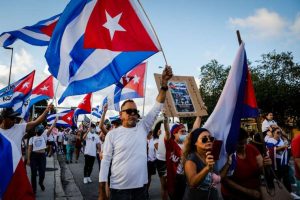Headlines
The History of Cuba: From Columbus to Castro

Cuba is an island country located in the Caribbean Sea. The history of Cuba dates back to the arrival of Christopher Columbus in 1492. The island was inhabited by various Amerindian cultures before the Spanish conquest. After Columbus’ arrival, Spain conquered Cuba and appointed Spanish governors to rule in Havana. The administrators in Cuba were subject to the Viceroy of New Spain and the local authorities in Hispaniola.
See Population, Official Language And More…

Cuba people with flag
In 1762–63, Havana was briefly occupied by Britain, before being returned to Spain in exchange for Florida. A series of rebellions between 1868 and 1898, led by General Máximo Gómez, failed to end Spanish rule and claimed the lives of 49,000 Cuban guerrillas and 126,000 Spanish soldiers. However, the Spanish–American War resulted in a Spanish withdrawal from the island in 1898, and following three-and-a-half years of subsequent US military rule, Cuba gained formal independence in 1902.
In the years following its independence, the Cuban republic saw significant economic development but also political corruption and a succession of despotic leaders, culminating in the overthrow of the dictator Fulgencio Batista by the 26th of July Movement, led by Fidel Castro, during the 1953–1959 Cuban Revolution. The new government aligned with the Soviet Union and embraced communism. In the early 1960s, Castro’s regime withstood invasion, faced nuclear Armageddon, and experienced a civil war that included Dominican support for regime opponents. Following the Warsaw Pact invasion of Czechoslovakia (1968), Castro publicly declared Cuba’s support. His speech marked the start of Cuba’s complete absorption into the Eastern Bloc. During the Cold War, Cuba also supported Soviet policy in Afghanistan, Poland, Angola, Ethiopia, Nicaragua, and El Salvador.
The Cuban economy was mostly supported by Soviet subsidies. With the dissolution of the USSR in 1991 Cuba was plunged into a severe economic crisis known as the Special Period that ended in 2000 when Venezuela began providing Cuba with subsidized oil. The country has been politically and economically isolated by the United States since the Revolution but has gradually gained access to foreign commerce and travel as efforts to normalize diplomatic relations have progressed.





